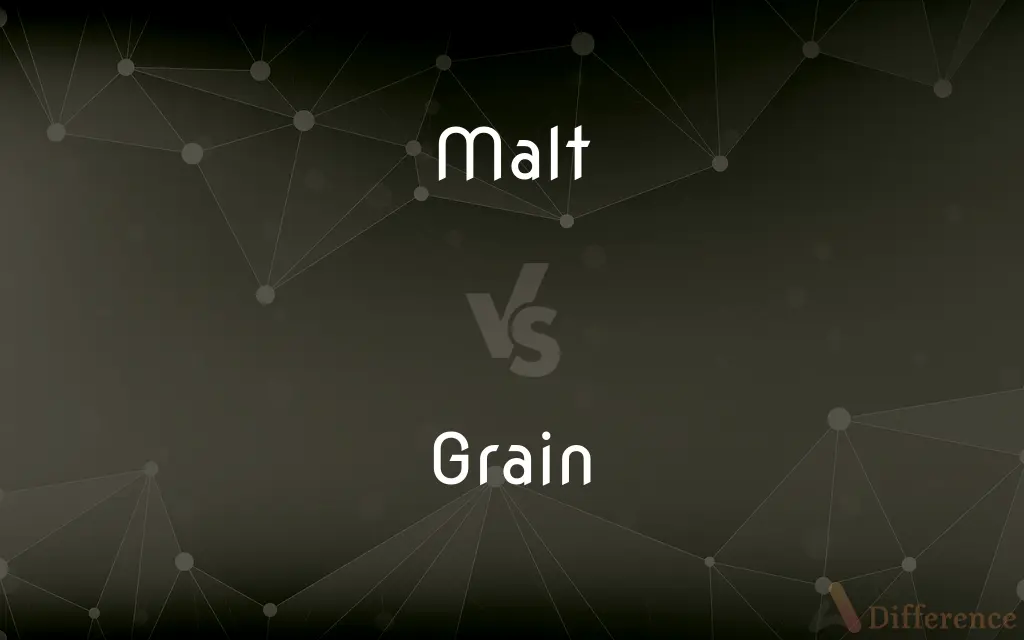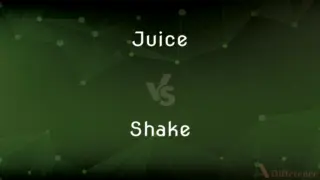Malt vs. Grain — What's the Difference?
By Tayyaba Rehman & Urooj Arif — Published on February 10, 2024
Malt refers to grains that have been germinated and dried, commonly used in brewing and distilling. Grain is the seed or small hard fruit of cereal crops, used in various food products and alcoholic beverages.

Difference Between Malt and Grain
Table of Contents
ADVERTISEMENT
Key Differences
Malt is essentially grain that has undergone a process of germination and drying. This process, known as malting, alters the grain's natural composition, enhancing its fermentable sugars. On the other hand, grain refers to the seeds or small hard fruits of cereal crops, such as wheat, barley, and rye, which are used in a variety of food products and as the base ingredient in the production of malt.
In the production of beer and whiskey, malt serves as a crucial ingredient, providing the necessary sugars for fermentation. The malting process involves soaking the grain in water, allowing it to germinate, and then drying it to halt the germination. Grains, in their raw form, are used in a wide array of products, from bread and cereals to livestock feed, but they must be malted before they can be effectively used in brewing and distilling.
The flavor profile of malt varies depending on the grain used and the malting process. Malted barley, for example, imparts a distinct flavor to beer and whiskey. In contrast, grains themselves have a more neutral flavor and are valued for their nutritional content, including carbohydrates, proteins, and fibers.
Malt can also be found in non-alcoholic products, such as malt vinegar and malted milk. These products highlight malt's versatility beyond alcoholic beverages. Conversely, grains are staple food items globally, forming the foundation of diets across cultures, owing to their versatility and nutritional value.
Specialty malts, which undergo additional processing, contribute to the color and flavor complexity of beers and whiskeys. Grains, when used in their unmalted form, often serve more functional roles in food production, such as providing structure to bread or serving as a base for cereal products.
ADVERTISEMENT
Comparison Chart
Definition
Germinated and dried grains
Seed or small hard fruit of cereal crops
Use in Brewing
Essential for fermentation
Must be malted for brewing and distilling
Flavor Profile
Varied, depending on malting process
More neutral, varies between grain types
Primary Use
Brewing, distilling, malted products
Food products, livestock feed, malting
Nutritional Content
High in fermentable sugars
High in carbohydrates, proteins, fibers
Compare with Definitions
Malt
A powder made from malt, milk, and wheat flour, used in beverages and baking.
She added malt to her milkshake for extra flavor.
Grain
The seed or small hard fruit of cereal crops like wheat or barley.
Farmers harvested the grain at the end of the season.
Malt
A sweet syrup or powder produced from malt, used as a flavoring or sweetener.
He used malt extract in his baking recipe.
Grain
A basic dietary item made from cereal crops.
Grain such as rice is a staple food in many countries.
Malt
A product made from germinated dried grains, used in beer making.
The brewery sources its malt from local producers.
Grain
The raw material that is malted for use in brewing.
They selected a high-quality grain to produce their malt.
Malt
A type of vinegar made from malted barley.
Malt vinegar is a classic accompaniment to fish and chips.
Grain
Unprocessed grain, including the bran, germ, and endosperm.
Whole grain breads are richer in nutrients.
Malt
Barley grains that have been malted, commonly used in brewing and distilling.
The whiskey's rich flavor comes from the malted barley.
Grain
A small, dry, one-seeded fruit of a cereal grass, having the fruit and the seed walls united
A single grain of wheat.
Gleaned the grains from the ground one at a time. Also called caryopsis.
Malt
Grain, usually barley, that has been allowed to sprout, used chiefly in brewing and distilling.
Grain
The fruits of cereal grasses especially after having been harvested, considered as a group
The grain was stored in a silo.
Malt
An alcoholic beverage, such as beer or ale, brewed from malt.
Grain
A cereal grass
Wheat is a grain grown in Kansas.
Malt
See malted milk.
Grain
Cereal grasses considered as a group
Grain is grown along the river.
Malt
To process (grain) into malt.
Grain
A relatively small discrete particulate or crystalline mass
A grain of sand.
Malt
To treat or mix with malt or a malt extract.
Grain
A small amount or the smallest amount possible
Hasn't a grain of sense.
Malt
To become malt.
Grain
(Aerospace) A mass of solid propellant.
Malt
Malted grain sprouted grain (usually barley), used in brewing and otherwise.
Grain
Abbr. gr. A unit of weight in the US Customary System, an avoirdupois unit equal to 0.002285 ounce (0.065 gram).
Malt
Malt liquor, especially malt whisky.
Grain
The markings, pattern, or texture of the fibrous tissue in wood
Cherry wood has a fine grain.
Malt
A milkshake with malted milk powder added for flavor.
Grain
The direction of such markings
Cut a board with the grain.
Malt
Maltose-rich sugar derived from malted grain.
Grain
The side of a hide or piece of leather from which the hair or fur has been removed.
Malt
(transitive) To convert a cereal grain into malt by causing it to sprout (by soaking in water) and then halting germination (by drying with hot air) in order to develop enzymes that can break down starches and proteins in the grain.
Grain
The pattern or markings on this side of leather.
Malt
(intransitive) To become malt.
Grain
The pattern produced, as in stone, by the arrangement of particulate constituents.
Malt
To drink malt liquor.
Grain
The relative size of the particles composing a substance or pattern
A coarse grain.
Malt
Barley or other grain, steeped in water and dried in a kiln, thus forcing germination until the saccharine principle has been evolved. It is used in brewing and in the distillation of whisky.
Grain
A painted, stamped, or printed design that imitates the pattern found in wood, leather, or stone.
Malt
Relating to, containing, or made with, malt.
Grain
The direction or texture of fibers in a woven fabric.
Malt
To make into malt; as, to malt barley.
Grain
A state of fine crystallization.
Malt
To become malt; also, to make grain into malt.
Grain
Basic temperament or nature; disposition
It goes against my grain to ask for help.
Malt
A milkshake made with malt powder
Grain
An essential quality or characteristic
"Toughness as a virtue ... is, needless to say, fully embedded in the American grain" (Benjamin DeMott).
Malt
A lager of high alcohol content; by law it is considered too alcoholic to be sold as lager or beer
Grain
(Archaic) Color; tint.
Malt
A cereal grain that is kiln-dried after having been germinated by soaking in water; used especially in brewing and distilling
Grain
To cause to form into grains; granulate.
Malt
Treat with malt or malt extract;
Malt beer
Grain
To paint, stamp, or print with a design imitating the grain of wood, leather, or stone.
Malt
Turn into malt, become malt
Grain
To give a granular or rough texture to.
Malt
Convert grain into malt
Grain
To remove the hair or fur from (hides) in preparation for tanning.
Malt
Convert into malt
Grain
To form grains
The corn began to grain.
Grain
(uncountable) The harvested seeds of various grass food crops eg: wheat, corn, barley.
We stored a thousand tons of grain for the winter.
Grain
(uncountable) Similar seeds from any food crop, e.g., buckwheat, amaranth, quinoa.
Grain
(countable) A single seed of grass food crops.
A grain of wheat
Grains of oat
Grain
The crops from which grain is harvested.
The fields were planted with grain.
Grain
(uncountable) A linear texture of a material or surface.
Cut along the grain of the wood.
He doesn't like to shave against the grain.
Grain
(countable) A single particle of a substance.
A grain of sand
A grain of salt
Grain
(countable) Any of various small units of mass originally notionally based on grain's weight, variously standardized at different places and times, including
Grain
The English grain of 5760 troy pound or 7000 pound avoirdupois, now exactly 64.79891 mg.
Grain
The metric, carat, or pearl grain of 4 carat used for measuring precious stones and pearls, now exactly 50 mg.
Grain
(historical) The French grain of 9216 livre, equivalent to 53.11 mg at metricization and equal to exactly 54.25 mg from 1812–1839 as part of the mesures usuelles.
Grain
Any of various small units of length originally notionally based on a grain's width, variously standardized at different places and times.
Grain
The carat grain of 4 carat as a measure of gold purity, creating a 96-point scale between 0% and 100% purity.
Grain
(materials) A region within a material having a single crystal structure or direction.
Grain
(rocketry) The solid piece of fuel in an individual solid-fuel rocket engine.
Grain
A reddish dye made from the coccus insect, or kermes; hence, a red color of any tint or hue, as crimson, scarlet, etc.; sometimes used by the poets as equivalent to Tyrian purple.
Grain
The hair side of a piece of leather, or the marking on that side.
Grain
(in the plural) The remains of grain, etc., after brewing or distillation; hence, any residuum. Also called draff.
Grain
(botany) A rounded prominence on the back of a sepal, as in the common dock.
Grain
Temper; natural disposition; inclination.
Grain
Visual texture in processed photographic film due to the presence of small particles of a metallic silver, or dye clouds, developed from silver halide that have received enough photons.
Grain
A branch of a tree; a stalk or stem of a plant.
Grain
A tine, prong, or fork.
Grain
One of the branches of a valley or river.
Grain
An iron fish spear or harpoon, with a number of points half-barbed inwardly.
Grain
A blade of a sword, knife, etc.
Grain
(founding) A thin piece of metal, used in a mould to steady a core.
Grain
To feed grain to.
Grain
(transitive) To make granular; to form into grains.
Grain
(intransitive) To form grains, or to assume a granular form, as the result of crystallization; to granulate.
Grain
To texture a surface in imitation of the grain of a substance such as wood.
Grain
(tanning) To remove the hair or fat from a skin.
Grain
(tanning) To soften leather.
Grain
To yield fruit.
Grain
See Groan.
Grain
To paint in imitation of the grain of wood, marble, etc.
Grain
To form (powder, sugar, etc.) into grains.
Grain
To take the hair off (skins); to soften and raise the grain of (leather, etc.).
Grain
To yield fruit.
Grain
To form grains, or to assume a granular form, as the result of crystallization; to granulate.
Grain
A single small hard seed; a kernel, especially of those plants, like wheat, whose seeds are used for food.
Grain
The fruit of certain grasses which furnish the chief food of man, as corn, wheat, rye, oats, etc., or the plants themselves; - used collectively.
Storehouses crammed with grain.
Grain
Any small, hard particle, as of sand, sugar, salt, etc.; hence, any minute portion or particle; as, a grain of gunpowder, of pollen, of starch, of sense, of wit, etc.
I . . . with a grain of manhood well resolved.
Grain
The unit of the English system of weights; - so called because considered equal to the average of grains taken from the middle of the ears of wheat. 7,000 grains constitute the pound avoirdupois, and 5,760 grains the pound troy. A grain is equal to .0648 gram. See Gram.
Grain
A reddish dye made from the coccus insect, or kermes; hence, a red color of any tint or hue, as crimson, scarlet, etc.; sometimes used by the poets as equivalent to Tyrian purple.
All in a robe of darkest grain.
Doing as the dyers do, who, having first dipped their silks in colors of less value, then give' them the last tincture of crimson in grain.
Grain
The composite particles of any substance; that arrangement of the particles of any body which determines its comparative roughness or hardness; texture; as, marble, sugar, sandstone, etc., of fine grain.
Hard box, and linden of a softer grain.
Grain
The direction, arrangement, or appearance of the fibers in wood, or of the strata in stone, slate, etc.
Knots, by the conflux of meeting sap,Infect the sound pine and divert his grainTortive and errant from his course of growth.
Grain
The fiber which forms the substance of wood or of any fibrous material.
Grain
The hair side of a piece of leather, or the marking on that side.
Grain
The remains of grain, etc., after brewing or distillation; hence, any residuum. Also called draff.
Grain
Temper; natural disposition; inclination.
Brothers . . . not united in grain.
Grain
A sort of spice, the grain of paradise.
He cheweth grain and licorice,To smellen sweet.
The red roses flush up in her cheeks . . . Likce crimson dyed in grain.
Grain
A branch of a tree; a stalk or stem of a plant.
Grain
A tine, prong, or fork.
Grain
A blade of a sword, knife, etc.
Grain
A thin piece of metal, used in a mold to steady a core.
Grain
A small hard particle;
A grain of sand
Grain
Foodstuff prepared from the starchy grains of cereal grasses
Grain
Used for pearls or diamonds: 50 mg or 1/4 carat
Grain
1/60 dram; equals an avoirdupois grain or 64.799 milligrams
Grain
1/7000 pound; equals a troy grain or 64.799 milligrams
Grain
Dry seedlike fruit produced by the cereal grasses: e.g. wheat, barley, Indian corn
Grain
The direction or texture of fibers found in wood or leather or stone or in a woven fabric;
Saw the board across the grain
Grain
Thoroughly work in;
His hands were grained with dirt
Grain
Paint (a surface) to make it look like stone or wood
Grain
Form into grains
Grain
Become granular
Grain
A primary component of animal feed.
The farm purchased grain to feed its livestock.
Common Curiosities
Are all grains used for malting?
Not all grains are used for malting; popular choices include barley, wheat, and rye.
Can malt be used in non-alcoholic products?
Yes, malt is used in non-alcoholic products like malt vinegar and malted milk.
What is malt made from?
Malt is made from grains that have been germinated and dried.
How does the flavor of malt differ from grain?
Malt has a more varied flavor profile, while grain is more neutral.
Are grains nutritious?
Yes, grains are nutritious, containing carbohydrates, proteins, and fibers.
What is specialty malt?
Specialty malt undergoes additional processing to contribute to the color and flavor of beers and whiskeys.
What are the health benefits of grain?
Grains are beneficial for health, providing essential nutrients like fiber, vitamins, and minerals.
What is malt extract?
Malt extract is a sweet syrup or powder made from malt, used as a flavoring or sweetener.
How is malt used in whiskey production?
In whiskey production, malted barley provides the fermentable sugars necessary for distillation.
Is grain a staple food globally?
Yes, grain is a staple food in many cultures worldwide, used in various forms.
What is the primary use of malt in brewing?
Malt provides essential sugars for fermentation in brewing and distilling.
Can grain be used directly in brewing?
Grain must be malted before it can be effectively used in brewing and distilling.
What makes malt vinegar unique?
Malt vinegar is made from malted barley and has a distinctive flavor.
Is whole grain the same as malt?
No, whole grain refers to the complete grain seed, while malt is grain that has been germinated and dried.
Do all beers use malt?
Most beers use malt as a primary ingredient for flavor and sugar content necessary for fermentation.
Share Your Discovery

Previous Comparison
ArrayList in Java vs. LinkedList in Java
Next Comparison
Juice vs. ShakeAuthor Spotlight
Written by
Tayyaba RehmanTayyaba Rehman is a distinguished writer, currently serving as a primary contributor to askdifference.com. As a researcher in semantics and etymology, Tayyaba's passion for the complexity of languages and their distinctions has found a perfect home on the platform. Tayyaba delves into the intricacies of language, distinguishing between commonly confused words and phrases, thereby providing clarity for readers worldwide.
Co-written by
Urooj ArifUrooj is a skilled content writer at Ask Difference, known for her exceptional ability to simplify complex topics into engaging and informative content. With a passion for research and a flair for clear, concise writing, she consistently delivers articles that resonate with our diverse audience.
















































